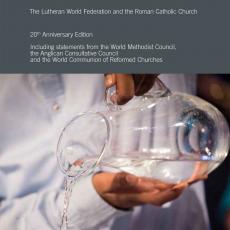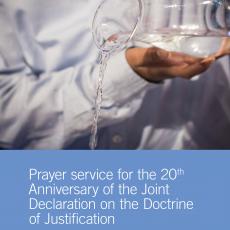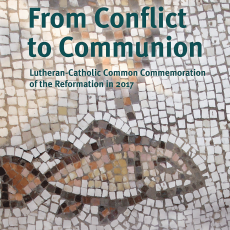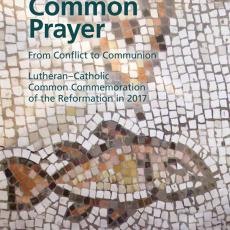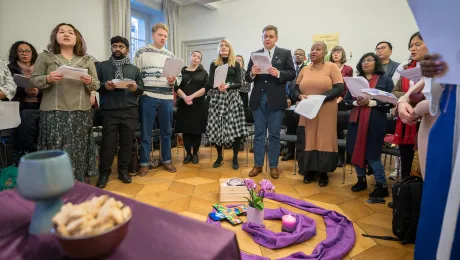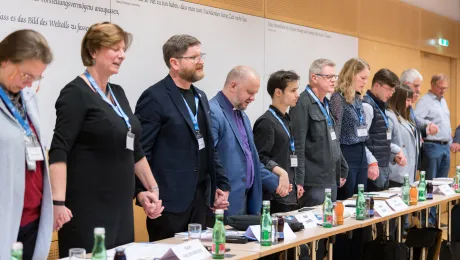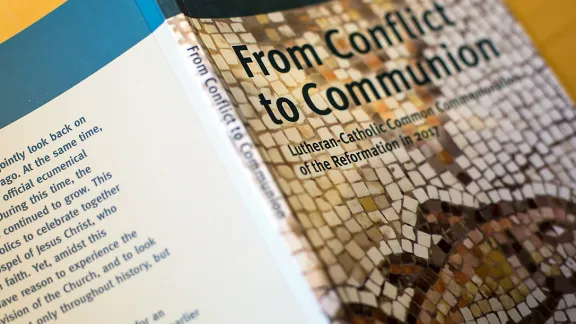
The Catholic-Lutheran commemoration in Lund, Sweden, is an important opportunity for Catholics and Lutherans to remember that the reconciliation to which God calls them is for the unity of the Church of Christ and of the world. Photo: LWF/S. Gallay
GENEVA, 2 February 2016 - The Lutheran World Federation (LWF) President Bishop Dr Munib A. Younan and General Secretary Rev. Dr Martin Junge encourage LWF member churches to seek ways of deepening relations with the Catholic Church globally and at the grassroots, and to work together to promote peace and reconciliation in joint diaconal work. In this interview they elaborate on the significance of the Lund event for relations between Lutherans and Catholics globally and for joint service in the world today. The Lutheran World Federation (LWF) and the Roman Catholic Church will jointly hold an ecumenical commemoration of the Reformation on 31 October 2016 in Lund, Sweden.
Why is the ecumenical commemoration in Lund important?
Junge: It is historic that Catholics and Lutherans are commemorating the anniversary of the Reformation together in October 2016. In Lund we come together to give thanks for the gifts of the Reformation and our 50 years of dialogue together, repent for the human suffering and disunity of the church that followed the Reformation and commit to joint witness in the world.
We are committed to take a step towards unity. We are seeking openness and encouragement to overcome the differences in practice and doctrine that still remain and move forward with the conviction that they can be overcome.
Younan: The dialogue between the LWF and the Pontifical Council for Promoting Christian Unity (PCPCU) has been ongoing for nearly 50 years now. An important milestone was the signing of the Joint Declaration on the Doctrine of Justification in 1999. This was very important as a step towards reconciliation. Lund is the next step. After 500 years, both churches are seeing together the faithfulness of the gospel and acknowledging that we are sent together as the body of Christ to serve in the world.
What do you mean when you speak of unity?
Junge: Lutherans and Catholics have committed together to seek visible unity, as expressed in our joint report From Conflict to Communion: Lutheran–Catholic Common Commemoration of the Reformation in 2017. The things uniting us are more powerful than those dividing us. In the future we need to further discuss the church, the ministry, and Holy Communion or Eucharist. The steps undertaken until now, and the encouragement we will receive from our joint commemoration will give us focus for that discussion.
When we speak of unity we also speak of reconciliation, of being convinced that it is possible to overcome fragmentation and that we can and will learn from each other. We believe it is possible to heal memories and we need to do so in order for us to jointly serve our wounded and fragmented world.
Younan: The Lund event is an important opportunity for Catholics and Lutherans to reflect together that the reconciliation to which God calls us in Christ is not for ourselves but for the unity of the Church of Christ and of the world. We remember what is written in John 17:21 -
"I pray that all of them may be one... so that the world may believe." Our relationships have deepened over the years, and when people see us working together, they can trust us.
It is also important that we not only think in terms of the leadership of the LWF or of the Catholic Church. This is about the grassroots where we can be united in diakonia, and where we can build more trust. The LWF World Service and Caritas, the diaconal arm of the Catholic Church, are serving people in need throughout the world. We should explore ways of carrying out our diaconal work together in many places such as the Middle East where the presence of Christians is threatened; in Malaysia where Christians are prohibited from using the name Allah; in Nigeria where extremists use violence against Christians; and at global level in fighting economic injustices and many forms of extremism including Islamophobia.
How was the venue chosen?
Junge: Lund was a joint decision of the LWF and the PCPCU. Lund is the birthplace of the LWF, in 1947. Catholics and Lutherans have worshipped in the Cathedral of Lund for 1,000 years.
But the Reformation anniversary will also be commemorated around the world. In Wittenberg, which holds a special place for Lutherans around the world, we have already started with the Luthergarten, where we aim at planting 500 trees by 2017, representing the 500 years of the Reformation. Prior to going to Lund the LWF Council will meet in Wittenberg in June this year.
Younan: Then in 2017 we will move to Windhoek, in Namibia where the Twelfth Assembly of the LWF will take place. By tracing this journey from the city of Wittenberg into the European context and then into the African region—Wittenberg to Lund and to Windhoek—we want to underline a message which we have been stressing throughout these years: the Lutheran Reformation has become a global citizen.
How does the Lund event help both partners to move forward?
Junge: Sometimes we churches deal with our past as if we didn’t have any future. The significance of the Lund event is that while we remain aware about our past, we are not going to conduct our dialogues against the background of past memories and our history. I believe that this very shift to intentionally leave conflict behind and embrace communion is going to make a difference to the way in which we will be able to talk to each other.
Younan: The action of reconciliation with the Mennonites in 2010 has inspired what we are going to do in Lund. We have experienced the power of forgiveness and reconciliation as the most encouraging and freeing power which has made us free to work, engage, connect, work together, to trust each other. We hope that the Holy Spirit will continue to lead us with the Catholics to Lund and beyond.
What has been the response to the announcement of the event in Lund?
Junge: The response has been very strong and positive both from the churches and secular media. We have been saying that we are carried by a profound conviction that by working towards reconciliation between Lutherans and Catholics we are contributing towards justice, peace and reconciliation in a world that is wounded because of fragmentation and sectarian violence. I interpret the strong attention this announcement has gotten as a sign of hope that reminds us there are other ways to deal with differences and conflict that lies behind us.
We are looking into ways of live streaming the event to make it accessible to people around the world, so that they can participate with their prayers, attentive listening and with their gathering internationally around the event.
Younan: We welcome the strong affirmation and endorsement received about the Lund event. We know very well that Lutheran churches around the world are at different stages when it comes to how they live and experience their relationship with the Catholic Church and the same applies for Catholic churches on the ground. Yet, knowing these realities, we want to emphasize the quest of our unity—leaving conflict behind and working work towards communion.
